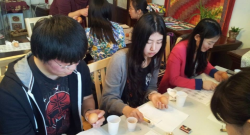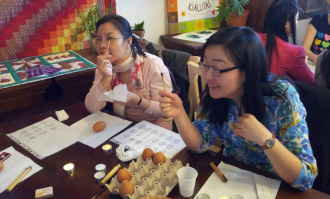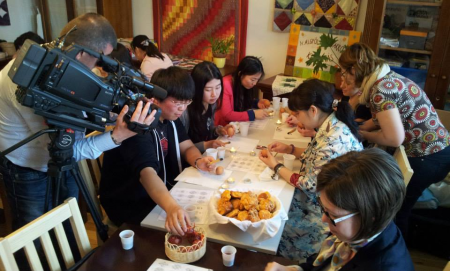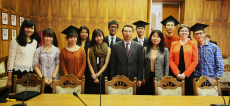University of Szeged, Konfucius Institute - Ahol tudás és szándék találkozik
 News
News
 CI NEWS ARCHIVES
CI NEWS ARCHIVES
 2014
2014
Chinese ’eggs of happiness’

The nine staff members of the Confucius Institute at University of Szeged have also been interested in the Hungarian Easter traditions. For this reason they have visited the Egg Workshop in Algyő, where they had the opportunity to try out the usage of a special tool for painting eggs called ’íróka’ and to make painted eggs. In the meantime, we have learnt the Chinese word for egg: jidan.
’In China we do not follow any tradition regarding the preparations for easter, since it is a Christian tradition. However we also paint eggs. Colorful eggs symbolize the arrival of a new born child to the house. We also call them »eggs of happiness«. One of the characteristics of these eggs is that they do not have any patterns”, explained Zhang Xuemei. The Chinese director and the teachers of the Confucius Institute at University of Szeged tried whether painting patterns on an egg is harder than calligraphy.

’We had a great time in the Creative House. The atmosphere there indeed inspired us to work together in a workshop style. It was very interesting to see the tools of egg painting and the patterns’, said Zhang Xuemei. The provided tools and sample patterns together with the technical instructions given by handicraft folk-artist Nóra Bereczné Lázár and the Egg Workshop’s stalwart member and Confucius Institute student Eszter Klatka made the collective work possible.
The lasting crafts of painted eggs were created using Hungarian and Chinese patterns. Some decorated their outblown chicken egg with ’gyimesi Csángó’ or South-Transylvanian style patterns, some decorated it with pandas.
The red color symbolizes many things in Chinese culture. For instance, when a child is born, Chinese people often paint their ’eggs of happiness’ red. ’The red color is important, because it symbolizes happiness and joy’, answered Zhang Xuemei, who thinks that ’when you celebrate, you need to use red color, because the color itself creates a festive atmosphere’.
The ’jidan’, namely the egg is the symbol of fertility in China as well, said Lívia Szentmártoni, the Hungarian director of the Confucius Institute at University of Szeged. In the online ’Asia lexicon’ it is written that in Zhejiang province the young wives hid eggs in the end of the wedding bed in order to ensure they become pregnant. After the child was born, they served omelet to the young wife for her to become stronger. On New Year’s, people exchange red eggs, symbolizing the ’exchange of happiness’. In some clans of South-China, egg is an element of their creation myth. The ’jin and qiang clans believe that goddess Hlineu laid an egg from which humans were born’. And we have learnt from the Chinese teachers of the Confucius Institute at University of Szeged that in some parts of China, on the 3rd day of the 3rd month of the lunar calendar, people traditionally eat boiled eggs in the spirit of revival.
 |
| Kínai boldogságtojások - GALÉRIA |
Zhang Xuemei said that it was interesting to get to know the zither – the sound of this instrument is quite familiar to Chinese people.
‘It is visible that good communities are working here and that everything is well organized in the Creative House of Algyő.’ said Zhang Xuemei, who was reminded on her native place, where community life is also very vivid, having daily, weekly regular gatherings. As for springtime traditions, the young to the old, Chinese people try to spend as much time outdoors as possible. They organize events where they celebrate the beauty of nature, during the time of blooming.
Text: Ilona Újszászi
Pictures: Confucius Institute at University of Szeged




